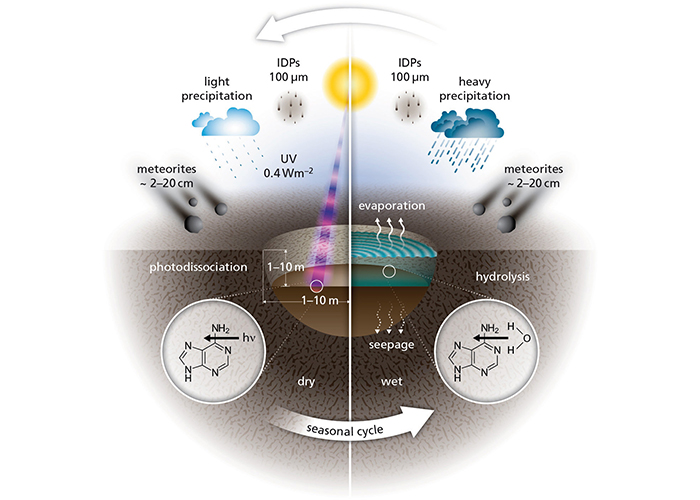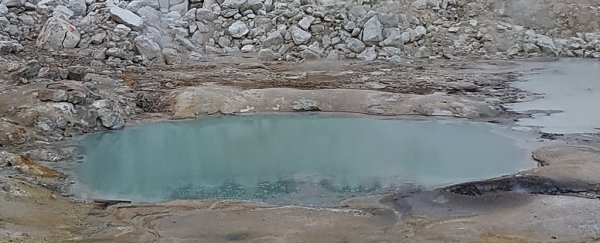New research suggests life on our planet started out as a series of meteorites struck the surface and landed in small, warm ponds, kicking off a chemical chain reaction leading to the very first bit of genetic code to exist on Earth.
While the 'warm ponds' hypothesis isn't completely new, the latest study pulls in a host of data and calculations to show just how plausible it is.
Researchers from McMaster University in Canada and the Max Planck Institute for Astronomy in Germany say this all started happening just a few million years after the Earth was cool enough for water to form, while the continents were still emerging from the oceans.
"No one's actually run the calculation before," says one of the team, Ben K. D. Pearce, from McMaster University. "This is a pretty big beginning. It's pretty exciting."
 The cycle at the centre of the new study. Credit: McMaster University
The cycle at the centre of the new study. Credit: McMaster University
That calculation looked at the possible formation of RNA polymers – the most basic molecules capable of storing genetic information and catalysing chemical reactions.
Could they have been formed as meteorite impacts deposited key organic building blocks, which then bonded with elements in the pond water?
Absolutely, says the team behind the new study, with the right levels of precipitation and evaporation along the way. Those RNA polymers would eventually have become more complex and developed into DNA, according to the researchers.
To back up their working, the scientists pulled in relevant research from astrophysics, geology, chemistry, biology, and other disciplines.
"Because there are so many inputs from so many different fields, it's kind of amazing that it all hangs together," says one of the researchers, Ralph Pudritz from McMaster University.
"Each step led very naturally to the next. To have them all lead to a clear picture in the end is saying there's something right about this."
The new calculations would put the origins of life on Earth somewhere between 3.7 and 4.5 billion years ago. That's earlier than some experts have put it, but we're still not certain – one recent rock study suggested the first organisms emerged about 4 billion years ago.
Other scientists think life first started deeper inside the Earth, through vents under the ocean or hot springs appearing on land. Peering back billions of years through time isn't easy, even with the sharpest minds in science on the case.
The researchers behind the warm pond and meteorite study do have one famous scientist behind them they can point to – Charles Darwin first suggested that life might have sprung up in "some warm little pond" back in 1871.
Not everyone is convinced the hypothesis checks out, though. Biologist John Sutherland, from the University of Cambridge in the UK, thinks the impact of meteorites hitting land would've vaporised any organic compounds before life had chance to take root.
"Large impactors that would have delivered the most organic material, collide with such energy that their organic cargo is atomised," he told Michael Marshall at New Scientist.
Nevertheless, the team behind the latest study says their models show a "consistent scenario" for the earliest beginnings of life on Earth. What's more, if we can nail down what happened on our own planet, it could be useful in analysing the rest of the cosmos.
Plenty more research needs to be carried out before we can say for sure just when life began – and what form it took – but it seems we're getting closer to an answer.
"We have provided plausible physical and chemical information about the conditions under which life could have originated," says Dmitry Semenov, one of the contributing researchers from the Max Planck Institute.
"Now it's the experimentalists turn to find out how life could indeed have emerged under these very specific early conditions."
The research has been published in PNAS.
